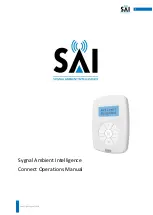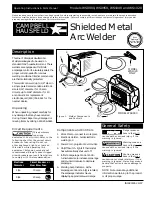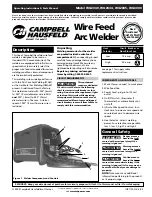
09/05
08-126-120
V
ESTIL
M
FG
.
C
O
./T&S
E
QPT
.
C
O
.
3 of 4
O
PERATION
I
NSTRUCTIONS
–
S-FORK
¬
Ensure that all employees involved in the operation and maintenance of this hoisting hook understand and
follow these instructions!
The S-FORK fork-mounted hoisting hook is intended to be used to lift and transport stable, hanging loads,
weighing up to 3,000 pounds, from a properly-rated fork truck’s fork. The rating of the required fork truck, and
the position of the hoisting hook on the fork truck’s fork, will depend on the center of gravity of the load and
the height to which the load will need to be lifted. Consult the fork truck manufacturer for a fork truck’s rating.
Note: OSHA 29CFR, Chapter XVII, Part 1910.178 (a)(4) states, “Modifications and additions which affect capacity
and safe operation (of a fork truck) shall not be performed by the customer or user without manufacturer’s prior
written approval. Capacity, operation, and maintenance instruction plates, tags, or decals shall be changed
accordingly. And 1910.178 (a)(5) states that “If (a fork) truck is equipped with front-end attachments other than
factory installed attachments, the user shall request that the truck be marked to identify the attachments and
show the approximate weight of the truck and attachment combination at maximum elevation with load laterally
centered.”
Attaching the S-FORK to a fork truck:
Slide the hoisting hook onto the fork truck’s fork to the desired point and turn the securing screw on each side
clockwise until they are both tight against the side of the fork. There should be approximately the same number
of screw threads turned in on each side of the hoisting hook. Secure the hoisting hook to the fork truck’s mast by
wrapping the hoisting hook’s securing strap around a vertical member of the fork carriage and fasten the strap’s
snap hook back onto the strap.
Loading:
The load rating, 3,000 pounds, is shown on the top of the hoisting hook. It indicates the static capacity of the
hoisting hook.
¬
Warning: Do not attempt to use the hoisting hook in any pulling application.
¬
Warning: Do not exceed the hoisting hook’s load rating. Permanent damage to the hoisting hook or injury to
personnel could result from exceeding the listed capacity.
¬
Warning: Caution must be exercised when determining the best method by which to hang a load from the
hoisting hook. Swinging suspended loads can injure personnel and damage equipment.
¬
Caution: Consult the fork truck owner’s manual for the forklift’s capacity at the intended vertical and
horizontal center-of-gravity of the load.
Operation:
Before using the hoisting hook, review all of the sections included in this manual!
•
Consult ANSI / ASME B56.1-2000, “Safety Standard For Low Lift And High Lift Fork Trucks,” for further
information regarding procedures to be used when operating a fork truck with a hoisting hook attached.
¬
Warning: Do not attempt to use the hoisting hook without the fork securing screws being tightened and the
safety strap securely attached to the fork truck’s mast. The strap hook’s safety latch must be closed around
the strap.
Tilt the fork truck’s mast back before attaching a load to the hoisting hook.
Use an appropriate lifting chain, nylon strap, or choker to connect the load to the hoisting hook.
Alert personnel in the area to stand at a safe distance from the load before attempting to lift or lower a load.
Lift the load slowly.
Watch the rigging and the load carefully for slippage or uneven lifting. If necessary, lower the load and adjust
the rigging to ensure the load will remain stable while hanging from the hoisting hook.
Keep loads as close to the ground as possible and do not exceed a travel rate of two feet/second when loads are
being transported.
Avoid bumps, potholes, and inclined surfaces when transporting a load.
When loads are lowered into place, be certain that the load is stable and well-supported before attempting to
remove the rigging.
¬
Warning: Improper rigging practices could result in injury to personnel or damage to property. Use only
properly-rated lifting chains, nylon straps, chokers, and connecting hardware when lifting loads.
¬
Warning: All personnel must maintain a safe distance from loads whenever they are suspended from the
hoisting hook. Be certain no part of any person or object is under or near any part of the load.
¬
Caution: Use the hoisting hook only on a smooth, level, finished surface. Avoid sudden stops or quick turns.
¬
Caution: Always carefully watch the hook and any load hanging from it when it is in use.
¬
Caution: Never use the hoisting hook if any damage is observed or if it is in need of repairs.
Notify your supervisor or maintenance personnel if you notice anything out of the ordinary.
Ensure that all safety and warning labels stay in place and are legible.
WM-Vestil S-Fork Hoisting Hook
Rev.0
WM-Vestil S-Fork Hoisting Hook
Printed on 9/20/13
Page 3 of 4






















